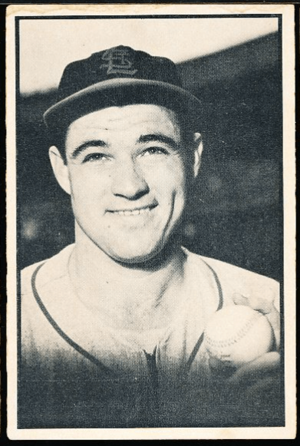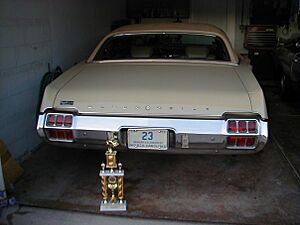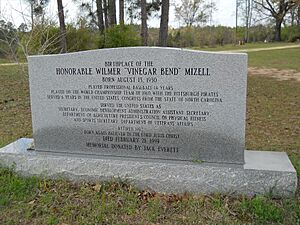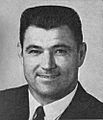Wilmer Mizell facts for kids
Quick facts for kids
Wilmer Mizell
|
|||
|---|---|---|---|
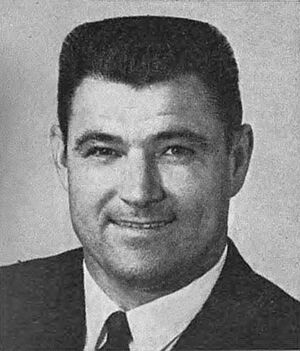 |
|||
| Member of the U.S. House of Representatives from North Carolina's 5th district |
|||
| In office January 3, 1969 – January 3, 1975 |
|||
| Preceded by | Nick Galifianakis | ||
| Succeeded by | Stephen L. Neal | ||
| Personal details | |||
| Born |
Wilmer David Mizell
August 13, 1930 Leakesville, Mississippi, U.S. |
||
| Died | February 21, 1999 (aged 68) Kerrville, Texas, U.S. |
||
| Political party | Republican | ||
| Spouses | Nancy Mizell (1st wife, died), Ruth Mizell | ||
|
Baseball career |
|||
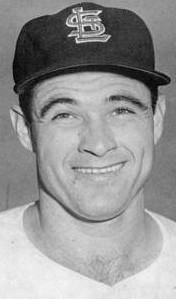 |
|||
| Pitcher | |||
|
|||
| debut | |||
| April 22, 1952, for the St. Louis Cardinals | |||
| Last appearance | |||
| July 25, 1962, for the New York Mets | |||
| MLB statistics | |||
| Win–loss record | 90–88 | ||
| Earned run average | 3.85 | ||
| Strikeouts | 918 | ||
| Teams | |||
|
|||
| Career highlights and awards | |||
|
|||
Wilmer David "Vinegar Bend" Mizell Sr. (born August 13, 1930 – died February 21, 1999) was an American athlete and politician. He was a left-handed pitcher in Major League Baseball from 1952 to 1962. He played for the St. Louis Cardinals, Pittsburgh Pirates, and New York Mets.
After his baseball career, Mizell became a politician. He was elected to the United States House of Representatives for North Carolina's 5th congressional district. He served three terms as a Republican from 1969 to 1975.
Mizell was born in Leakesville, Mississippi. He got his famous nickname, "Vinegar Bend," from the town of Vinegar Bend, Alabama, where he started playing baseball. He joined the Cardinals in 1949 and made his big league debut in 1952. He was known for his many strikeouts.
After serving in the military, he returned to the Cardinals in 1956. He was chosen for two Major League Baseball All-Star Games in 1959. In 1960, the Cardinals traded him to the Pittsburgh Pirates. Mizell helped the Pirates win the 1960 World Series against the New York Yankees. He finished his baseball career with the New York Mets in 1962.
Mizell settled in Midway, North Carolina, after playing baseball. Six years later, he was elected to Congress. He was known as a conservative politician. He worked to protect the New River from a power project. This effort helped make the river part of the National Wild and Scenic Rivers System in 1976. Mizell lost his re-election in 1974 and again in 1976. He later served in different government roles under Presidents Gerald Ford, Ronald Reagan, and George H. W. Bush. He passed away in 1999 after a heart attack.
Contents
- Early Life and Baseball Beginnings
- Wilmer Mizell's Baseball Career
- Wilmer Mizell's Political Career
- Wilmer Mizell's Personal Life
- Images for kids
Early Life and Baseball Beginnings
Wilmer David Mizell was born on August 13, 1930. His parents were Walter David and Addie Turner Mizell. Even though he was nicknamed "Vinegar Bend," he was born and grew up in Leakesville, Mississippi. His father died when Wilmer was only two years old. His grandmother and uncle helped raise him because his mother was often sick.
Wilmer worked hard on the family farm, growing fruits and vegetables. They also raised hogs and cattle. He earned extra money by hauling wood, logging, and collecting sap from pine trees. He once joked, "I walked behind more mules than I walked batters – and that's saying a lot." This showed how much work he did as a child.
Wilmer had trouble throwing straight when he was young. He practiced by throwing at a knothole in a smokehouse. He practiced so much that he eventually knocked the door in! At 16, he started playing for baseball teams. He pitched in Sunday leagues near Vinegar Bend, Alabama.
In 1948, the St. Louis Cardinals held a tryout in Biloxi, Mississippi. Mizell impressed them by getting three strikeouts before a storm stopped the tryout. A scout named Buddy Lewis visited him the next year. Mizell, just back from swimming, showed off his fastball. The scout promised to sign him for $500 after he graduated from high school. Right after getting his diploma, Mizell signed his contract and left for the train station to start his baseball career.
Wilmer Mizell's Baseball Career
Starting in the Minor Leagues (1949–1951)
Mizell's first team was the Albany Cardinals in the Class D Georgia–Florida League. His very first pitch went way over the backstop! But he quickly improved. He helped Albany win the league pennant. He had a great record of 12 wins and 3 losses. His earned run average (ERA) was 1.95, and he had 175 strikeouts in 141 innings pitched.
In 1950, he moved up to the Class B Winston-Salem Cardinals. He started with a 1–6 record but then turned it around. He finished with 17 wins and 7 losses. He was second in the league with a 2.48 ERA. He also struck out 227 batters in 207 innings. He helped Winston-Salem win a championship. In one game, he even hit his only professional home run. Fans were so happy they collected $220 for him!
In 1951, Mizell played for the Houston Buffaloes in the Class AA Texas League. The team even had a "Vinegar Bend Night." He struck out 15 batters in one game and 18 in another, tying a league record. He led the league with 257 strikeouts. Houston won the pennant by a large margin.
Playing for the St. Louis Cardinals (1952–1960)
When Mizell joined the Cardinals, announcer Harry Caray started calling him "Vinegar Bend." The nickname stuck. Sportswriter Red Smith called him "the left-handed Dizzy Dean." Mizell said this was "a perty heavy load for a boy to tote."
Early Success and Military Service
Mizell joined the Cardinals' starting rotation in 1952. He made his major league debut on April 22. He got his first major league shutout on June 21, striking out 11 batters. He finished his first season with 10 wins and 8 losses. He led the National League (NL) in strikeouts per 9 innings pitched. However, he also led the league in walks.
In 1953, Mizell continued to pitch well. He had a great game on May 4, giving up only two hits in a shutout against the Pirates. He finished the season with 13 wins and 11 losses. For the second year, he led the NL in strikeouts per 9 innings pitched. He was third in the league with 173 strikeouts.
After the 1953 season, Mizell joined the United States Army for two years during the Korean War. He played baseball for the fort's team, winning 36 games and losing only two. He threw four no-hitters and 16 shutouts. He was a sergeant when he was discharged.
Return to Baseball and All-Star Games
In the winter of 1955–56, Mizell played in Cuba. He became very popular there. He set records for most strikeouts in a game (15) and in a season (206).
He returned to the Cardinals in 1956. He won five straight games from May 21 to June 9. On September 7, he threw a two-hit shutout against the Cincinnati Redlegs. Six days later, he threw his second shutout in a row. He finished 1956 with 14 wins and 14 losses. He was fifth in the NL with 153 strikeouts.
In 1957, Mizell's fastball was slower. He spent time in the bullpen. But his control improved later in the year. On July 29, he threw a two-hit shutout against the Pirates. He finished the season with 8 wins and 10 losses.
He worked hard in the offseason before 1958. He lost weight and improved his pitching. He won four straight games from June 21 to July 12. On July 12, he threw a shutout against the Pirates. On September 1, he won a 1–0 game against Cincinnati. He set an NL record for most walks in a shutout with nine. He finished 1958 with 10 wins and 14 losses.
In 1959, Mizell's fastball was stronger. He had 10 strikeouts in a game on May 15. He was named to both Major League Baseball All-Star Game teams that year. In the first half of the season, he had a 9–3 record. However, back problems affected him in the second half. He finished the season with 13 wins and 10 losses.
By 1960, Mizell had recovered from his back issues. He started the season with the Cardinals but only won one of his first nine games. The Cardinals felt he hadn't reached his full potential. On May 28, they traded him to the Pittsburgh Pirates.
Winning the World Series with Pittsburgh (1960–1962)
Mizell's trade to the Pirates helped them win the championship that season. He pitched 30 scoreless innings from July 22 to August 9. This was the longest streak of his career. He threw two shutouts during this time. On July 29, he held the Cubs to two hits in a 4–0 win. Six days later, he shut out the Giants 1–0. In September, he had a 5–1 record as the Pirates won the NL pennant. He finished the season with 13 wins and 5 losses for the Pirates (14–8 overall).
Mizell started Game 3 of the 1960 World Series against the New York Yankees. He struggled and was removed early. However, he became a World Series champion. The Pirates won the series in Game 7 on Bill Mazeroski's famous home run.
In 1961, Mizell started strong with 4 wins and 1 loss. But he then struggled, losing seven straight games. He was moved to the bullpen. He did have one shutout that year against the Phillies. He finished the season with 7 wins and 10 losses.
In 1962, Mizell was traded to the New York Mets. Pirates fans and players were sad to see him go.
Final Season with the Mets (1962)
With the Mets, Mizell mostly pitched out of the bullpen. He failed to win a game with them. He was released on August 4.
After being cut by the Mets, the Pirates reacquired him. He played for their minor league team, the Columbus Jets. He had a 2–1 record there. But Pittsburgh did not call him back to the major leagues. Mizell retired from baseball in 1963.
Baseball Career Highlights
In his nine-season career, Mizell had 90 wins and 88 losses. His ERA was 3.85 in 268 games. He pitched 61 complete games, including 15 shutouts. He struck out 918 batters and walked 680. He was especially good against the Pirates, with a 14–7 record against them. Ray Owen, a sports editor, called Mizell "one of the best strikeout hurlers" in the National League for ten years.
How Wilmer Mizell Pitched
Mizell was 6 feet 3 inches tall. He threw hard with an easy motion. His pitching style made it hard for batters to see the ball. Ken Boyer said, "The guy shows you his glove, his rear, and somebody tells you it’s a strike." He had a high leg kick, which made it easier for runners to steal bases against him.
Early in his career, his fastball was his best pitch. But by 1960, his slow curveball became his strength. He also threw a slider. He sometimes struggled with control, but it improved in 1960.
Wilmer Mizell's Political Career
Local Government Roles
Wilmer Mizell lived in Midway, North Carolina, near Winston-Salem, after his baseball career. He worked as a broadcaster for the Winston-Salem Red Sox. He also worked in sales and public relations for Pepsi-Cola until 1967.
His former teammate, Dick Groat, said Mizell wasn't very political as a player. But Mizell entered North Carolina politics in the 1960s. He was elected to the Davidson County Board of Commissioners in 1966. He served as the chairman of the board for two years.
Serving in the U.S. House of Representatives
In 1968, Mizell was elected to represent North Carolina's 5th District in the 91st United States Congress. He defeated Smith Bagley, a Democrat. Mizell supported Richard Nixon. He ran on a platform against too much government spending. In his first term, he supported trade laws. He said, "I believe no nation in the world need fear the Trade Bill of 1970."
Mizell won re-election in 1970 and 1972. He was known for supporting financial responsibility and law and order. In 1971, he spoke in Congress about baseball's special rules. He said baseball helps young men achieve the "American dream." In 1972, he worked to allow more media outlets to broadcast sporting events.
Mizell strongly opposed the Blue Ridge Power Project. This project planned to build two dams on the New River. He worried about the environmental damage and families being forced to move. In 1974, he introduced a bill to make the New River part of the National Wild and Scenic Rivers System. This bill did not pass right away. But in 1976, Congress added the river to the system, stopping the dam project.
In 1974, Mizell also proposed an amendment to a law about legal services. This amendment prevented the government agency from handling desegregation lawsuits. He was also against desegregation busing. He believed that "Quality education...cannot be achieved while overwhelming additional expenses and administrative duties are required to implement court-ordered busing."
The Watergate scandal affected many Republicans in 1974. Mizell lost his re-election to Stephen L. Neal, a Democrat. Mizell ran against Neal again in 1976 but lost again.
Other Government Roles
After Congress, President Gerald Ford appointed Mizell as Assistant Secretary of Commerce. He held this job from 1975 to 1976. In 1982, President Ronald Reagan appointed him as Assistant Secretary of Agriculture. He was the Agriculture Department's main lobbyist. Later, in 1989, President George H. W. Bush appointed him to the United States Department of Veterans Affairs. He also became the executive director of the President's Council on Physical Fitness and Sports. In this role, he promoted physical fitness across the country.
Mizell was known as a very conservative politician. He also played in the annual Congressional Baseball Game. He once struck out seven Democrats in a row! He joked that Congress was a lot like a baseball clubhouse.
Wilmer Mizell's Personal Life
After his first season in baseball, Mizell married Nancy McAlpine. They had two sons, Wilmer David Jr. and James Daniel. Nancy passed away in 1990. In 1991, Mizell married Ruth Cox. They met at a prayer breakfast and spent years promoting prayer.
Mizell was known for his friendly personality. He had a nice drawl and a warm smile. People compared his friendly manner to another baseball player, Preacher Roe. Mizell was good friends with his teammate Hal Smith. They carpooled to games together. He was also close friends with Don Demeter, another Christian player.
Mizell was a religious man. He attended church regularly. He never swore. He explained, "I decided a long time ago swearin’ was a waste of words. You cain’t get a man out by cussin’ him out."
In 1998, Mizell had a heart attack while watching his son coach a football game. Four months later, on February 21, 1999, Wilmer Mizell passed away at age 68 in Kerrville, Texas. Senator Jesse Helms said, "One doesn’t lose a friend like Wilmer Mizell without experiencing a deep and penetrating sadness." He was buried in the Faith Missionary Alliance Church Cemetery in Winston-Salem.
Images for kids


